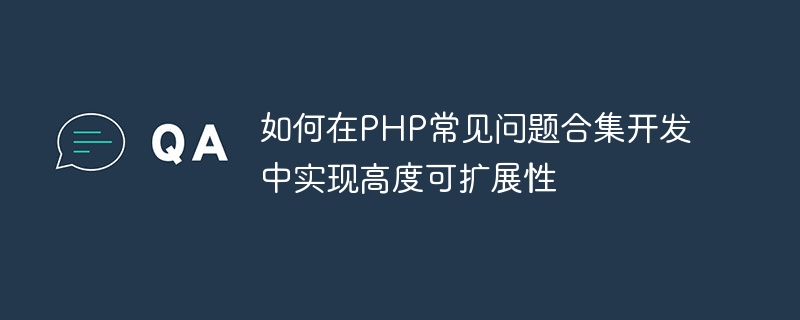Home >Backend Development >PHP Tutorial >How to achieve high scalability in PHP FAQ development
How to achieve high scalability in PHP FAQ development
- PHPzOriginal
- 2023-09-12 09:31:411583browse

How to achieve high scalability in PHP FAQ development
Overview:
In the PHP development process, we often face the need to deal with various Various common problems, such as form validation, database query, image processing, etc. In order to improve development efficiency and code reusability, we need to summarize and organize these common problems so that they can be quickly called when needed, while ensuring a high degree of scalability of the system. This article will introduce some methods of implementing a collection of PHP FAQs and how to achieve a high degree of scalability during development.
1. Classify and organize common problems
During the development process, we can divide common problems into different modules or functions, such as form verification, file upload, email sending, etc. For each module, we can create a corresponding PHP class to handle issues related to the module. In this way, we can gather related code and logic together for easy calling and maintenance.
2. Use the idea of object-oriented programming
During the development process, we can use the idea of object-oriented programming to encapsulate a collection of common problems into PHP classes or objects. This increases code reusability and enables a high degree of extensibility through features such as inheritance and polymorphism.
3. Introducing an automatic loading mechanism
When implementing a collection of frequently asked questions, introducing an automatic loading mechanism is a good choice. Through the automatic loading mechanism, we can automatically load the corresponding class file when we need to use a common problem, thereby simplifying the process of code writing and maintenance.
4. Adopt MVC architecture
Adopting MVC architecture can effectively separate the business logic and interface display during the development process. In the development of PHP FAQ collection, we can use the problem collection as the model layer, the user interface and interaction as the view layer, call and process the problem collection through the controller layer, and return the results to the user interface for display. This makes the code structure clear and easy to maintain, while also achieving a high degree of scalability.
5. Adopt design patterns
In the development of PHP FAQ collection, we can learn from some common design patterns, such as factory pattern, singleton pattern, observer pattern, etc. By rationally using design patterns, you can reduce the coupling of code and improve the reusability and scalability of code.
6. Write documentation and sample code
During the development process, we should write documentation and sample code in a timely manner to facilitate other developers to understand and use the FAQ collection. The document should include the function description of the problem, the calling method and parameter introduction, etc. The sample code should show the usage scenarios of common problems and the specific calling method. This improves code readability and ease of use, while also speeding up development and reducing communication costs.
Summary:
In the development process of PHP FAQ collection, achieving a high degree of scalability is an important consideration. By classifying and organizing common problems, using object-oriented programming ideas, introducing automatic loading mechanisms, adopting MVC architecture, adopting design patterns and writing documents and sample codes, we can improve development efficiency, code reusability and system scalability. In the actual development process, we should choose the most appropriate development methods and technical means based on specific needs and project characteristics in order to better achieve a highly scalable PHP FAQ collection.
The above is the detailed content of How to achieve high scalability in PHP FAQ development. For more information, please follow other related articles on the PHP Chinese website!

